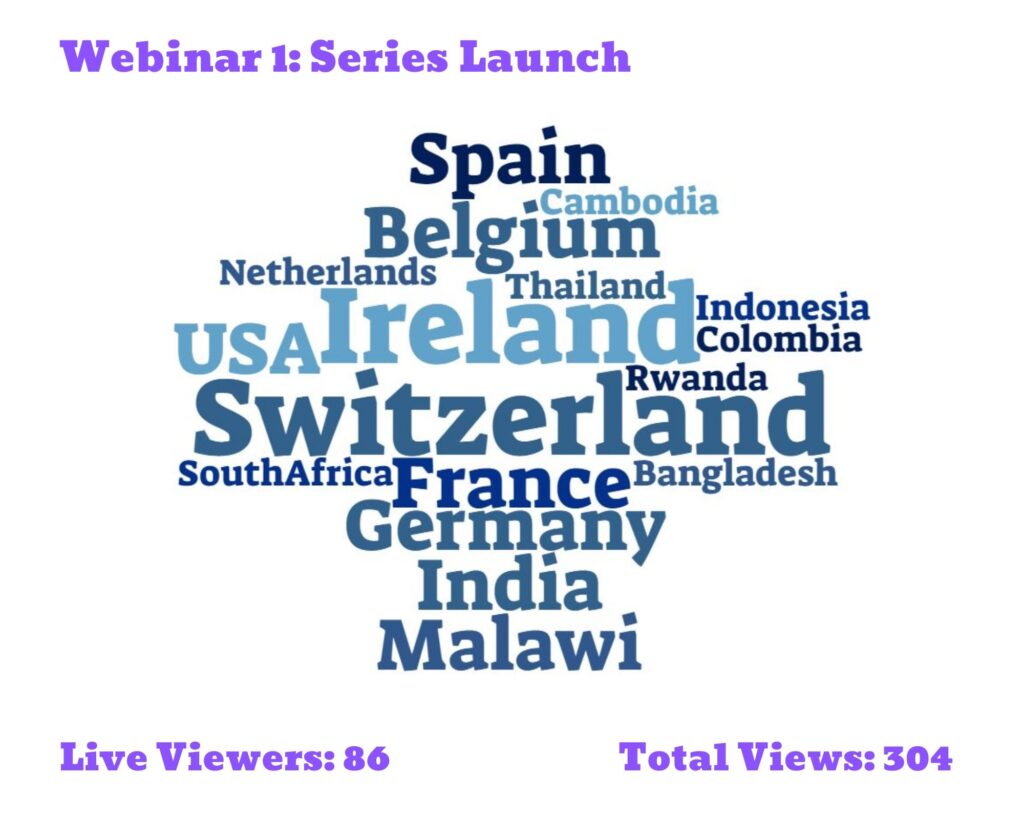Conversations on COVID-19 1st Webinar: Launch of COVID Conversations
 WEBINAR SERIES: WEEK ONE Launch of COVID-19 Conversations
WEBINAR SERIES: WEEK ONE Launch of COVID-19 Conversations
The first webinar was held on Friday 20/03/2020 at 1:00 pm GMT.
VIEW THE WEBINARWEBINAR EVALUATION
A SUMMARY OF POINTS MADE
Prof Ruairi Brugha – Professor Emeritus, Former Head of Epidemiology and Public Health, RCSI, Ireland
In many Asian countries eg Japan, South Korea etc. relatively effective COVID-19 suppression has been seen. In Europe, these measures have been less effective. The third stage of the epidemic will be seen in how this virus affects LMICs, and how best to help them prepare.
Even with appropriate social distancing, individual and community-wide, the virus will likely remain a key public health issue until 2021, or until a vaccine is widely distributed. Feasible, implementable plans must be made.
In order to support LMICs and within our own countries, staff must be protected and supported, and assistance must be provided to governments and beneficiaries.
SEE RUAIRI’S SLIDE PRESENTATION HERE
Diarmuid McClean, Development Specialist, Deputy Head of Mission for Embassy of Ireland in Lilongwe, Malawi
(At time of recording) Zero Cases in Malawi. Leadership is crucial as a key determinant of country’s success in stemming the spread. There must be drastic action taken ahead of time to mitigate the risks of widespread infection in LMICs. This pandemic will effect all of society, so response must be seen from all sides, and quickly.
While there are good facilities and NGO infrastructure, vigilance is vital. Party politics is distracting from the importance of epidemic readiness in Malawi. The embassy is taking initiative, along with agencies with country-wide influence, trying to lead by example and implement mitigation measures.
Practically, isolation is difficult in Malawi, especially in poorer communities. Health system is already stressed, with few isolation/oxygen support facilities etc. 10% of population are on Anti Retro-Viral medication, and general health is not as robust as in many other countries, so the rates of infection and death caused by COVID-19 will remain to be seen.
Niall Roche, WASH/Env. Health Consultant and Lecturer, IGHN Board Member
Key prevention measure in Ireland is personal/community behavioral change – communication of public health messages, political leadership:
“Don’t be afraid to fail, just act” – Mike Ryan, WHO
The importance of being proactive and not reactive; in Ireland, response has been relatively impressive.
Supermarkets have become one of the most risk-prone places for people to congregate in groups and therefore risking further virus spread. The standards of social distancing measures have not been consistent from place to place.
Appropriate measures:
Controlled entry/exit & ventilation, disinfecting carts/baskets, Hand sanitisers on entry/exit, announcements/posters, clear demarcation for social distance & clear cleaning procedures etc.
To see full “Quick guide to safe shopping during the coronavirus (COVID-19) pandemic” created by Niall, IGHN and the Chartered Institute for Global Health, CLICK HERE
WaSH must work in conjunction with all other health clusters in the coming months. Communication of messages, and through whom? WaSH in the Community/healthcare facilities is vital, though often underfunded. Behaviour Change Measures are vital to suppress the curve. Globally, fewer than 20% of the world’s population wash their hands after using the bathroom, so messaging needs to be scaled up.
Topics covered in the discussion portion included:
- How Education is the Social Vaccine for COVID-19 as it was proven for many countries with HIV/AIDS
- The situation in Malawi and what can be learned from Ireland’s response – how the pandemic represents a protection issue
- The inherent vulnerability of the health systems should ventilators become rationed if the pandemic goes beyond the surge system in countries affected
- The vulnerable situation of those on ARVs with micronutrient deficiencies and the duty of care to staff
- The situation for the 896 million people globally who use health facilities with no water supply – and the work that needs to be done in healthcare facilities

CATEGORIES
- Equity in Action Blog
- Training Programmes
- Sponsorship
- Vaccine Equity
- Get Global – Global Health Talks
- Student Outreach Team
- Get Global Young Professionals Talk Global Health
- Global Health Matters – Live Event Series
- Global Health Matters – IGHN Live Event Series
- An initiative of Irish Global Health Network
- ESTHER Ireland and ESTHER Alliance for Global Health Partnerships
- Global Health Matters – Webinar Series
- ESTHER
- IGHN Conferences
- Global Health Conference 2020
- Women in Global Health – Ireland Chapter
- ESTHER Partnerships
- Weekly Webinar Series
- 4th Global Forum on HRH
- Access to Medicines
- Archive Page Weekly COVID Webinars
- Clean Cooking 2019
- Climate Change and Health Conference 2017
- Conference Abstracts
- Conference Materials
- Covid FAQ
- COVID Funding Opportunities
- COVID-19
- COVID-19: Gender Resources
- Dashboard and online resources
- Education
- ESTHER Alliance
- Events
- Events & News
- Funding covid
- Global Health Exchange 2018
- Global Health Exchange 2019
- Global Health symposium 2019
- Health Workforce/HRH
- Homepage Featured
- Homepage recent posts
- IFGH 2011-2012 Conference and Events
- IFGH 2014 Conference
- IFGH Multimedia
- Irish AIDS Day 2017
- Irish News and Feeds
- Key Correspondent Articles
- Key Correspondent News
- Maternal Health
- Multimedia
- News
- News & Events
- Newsletter
- Opportunity
- Our LMIC's Resources for COVID19
- Partner Country News and Feeds
- Past Events
- Policy
- Presentations
- Recurring events
- Reports & Publications
- Research
- Resources
- Student Outreach Group
- Students Corner
- TEDTalks
- TRAINING COURSES FOR HEALTH CARE PROFESSIONALS
- Uncategorized
- Upcoming Events
RECENT POSTS

Imagine a world without nurses

Making Therapy Accessible: Reimagining Mental Health Through Traditional Healing and Language by Talha AlAli

Decolonisation as a framework for Youth Partnership in Global Health by Arwa Hany Sharaby

“Fight the bullies!”

SOT Pre-Conference Event 2025

